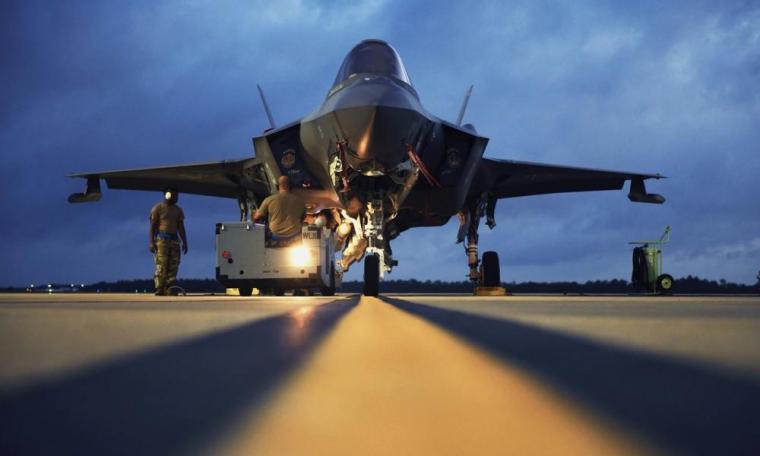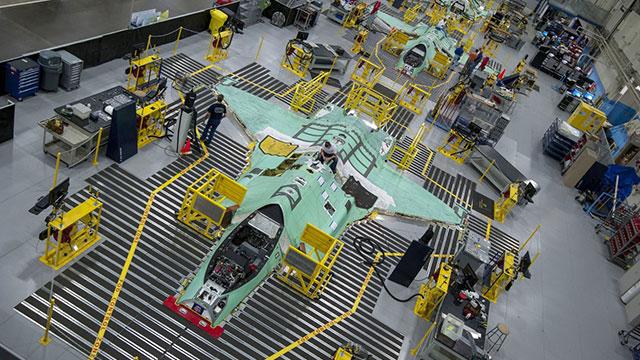The F-35 is making new history as the most capable fifth-generation fighter, but it has been criticised from time to time. The troubled history of the F-35 fighter aircraft, one might say.
The fighter's upgraded electronic warfare capabilities have been in Athens' sights from the start, as the F-35 will be called upon to operate in a modern threat environment.
According to the manufacturers, the TR-3 configuration gives the aircraft 25 times more computing power than the F-35s currently in service.
Multiple software problems, funding issues that halted software development for eight months in 2021 and the addition of new capabilities will also delay delivery of the final Block 4 capabilities (in 2029), three years later than originally expected.

Assembly of the first two F-35As for the Belgian Air Force has begun at Lockheed Martin's Fort Worth plant. Under the terms of the contract for the supply of 34 F-35As, the first two aircraft must be ready and delivered before the end of the year.
However, the Belgian Air Force is refusing to accept the first finished aircraft with tail number AY-01, which has already left the final assembly line. According to the Belgian military, the first two completed AY-01 and AY-02 aircraft do not meet the technical requirements of the Block 4 modification.
The cost of major upgrades to the F-35 fighter continues to rise, and recurring delays in critical simulation tests need to be fixed, resulting in (potentially) affecting the Greek purchase of the fighter.
At this point we want to highlight the overall cost of the program and in the overall prioritization of armament needs and priorities for the Greek Armed Forces. A possible delay in delivery or a similar problem of our country to that of Belgium for the supersonic fighters will certainly affect the operational aspect of our air force.
Even for the PA itself, the needs that exist in no way rank the acquisition of the F-35 as the first and main priority.

Of course it is a weapon system with new capabilities. But the Greek Armed Forces need other even more important capabilities which are ranked higher.
It should be noted that the Belgian purchase contract specified that the aircraft would be delivered in the most modern version available. Currently, the latest modification is the Block 4 version, with which the F-35A should receive several new features.
This modification includes a new TR-3 integrated core processor with higher processing power, a panoramic cockpit display, an improved memory module, a new radar, an electronic warfare system, the ability to use modern weapons and other upgrades.
TR-2 instead of TR-3
According to Lockheed Martin, these upgrades will make the stealth aircraft more resilient to modern ground and air threats in both offensive and defensive missions. Work is currently underway to further integrate and certify the TR-3 processor, which will take longer than previously anticipated.

The installed previous generation TR-2 processor does not have the necessary power reserve for the new Block 4 modification. Now it is planned that, all work on the new version will be completed in the second quarter of 2024.
"The Belgian Air Force will not accept F-35A fighters until the upgrade to the Block 4 version with the TR3 processor is completed and until the fighter is fully tested and certified," the Belgian Ministry of Defence announced.
At the heart of this delay is Block 4, an ambitious Pentagon effort to update several technologies in the F-35 fleet. However, before these jets can receive Block 4 upgrades, they need a set of hardware and software improvements, known collectively as Technology Refresh 3 or TR-3. Unfortunately, TR-3 is already a year behind its original schedule.
Despite the delay, Lockheed Martin continues to produce the fighters, amassing a stockpile at Fort Worth, Texas. Indeed, it believes that once the software problems are resolved, production will be restored quickly.
The first TR-3 flight test, conducted in January, revealed software problems but they were overlooked during laboratory testing, according to a recent Government Accountability Office (GAO) report.

Importantly, the GAO report also highlighted the escalating costs for Block 4 upgrades, with an increase of $1.4 billion since their April 2022 report, bringing the total to $16.5 billion.
However, this will be the third time in less than a year that F-35 deliveries have been interrupted. In September 2022, the Pentagon announced that, it had temporarily halted F-35 deliveries after the discovery of a Chinese-origin alloy that had been used for years to make a key magnet in the fighter.
Pre-delivery acceptance flights were also halted in December, which resulted in deliveries being halted due to an engine vibration problem that led to a Dec. 15 accident with an F-35B.



